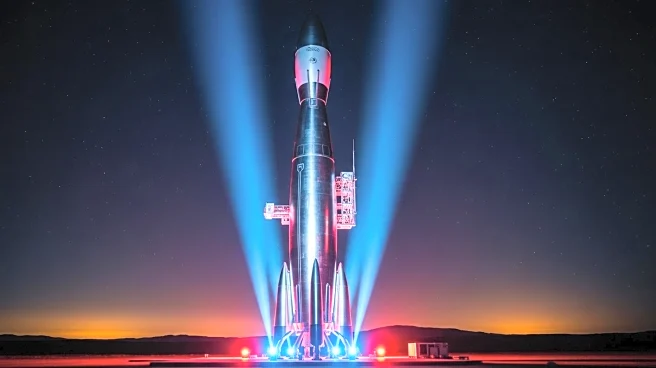What is the story about?
What's Happening?
SpaceX successfully launched its 11th Starship rocket from Texas, marking the final flight before debuting a new version of the rocket with enhanced features for moon and Mars missions. The Starship, which includes the upper stage stacked atop its Super Heavy booster, launched from SpaceX's Starbase facilities and landed in the Indian Ocean. The test flight included deploying mock Starlink satellites, re-lighting engines in space, and testing new heat shield tiles. Acting NASA Administrator Sean Duffy praised the mission as a major step toward landing Americans on the Moon's south pole.
Why It's Important?
The successful test flight of SpaceX's Starship is crucial for NASA's Artemis program, which relies on the rocket to land astronauts on the Moon. The test flight demonstrated the rocket's capabilities and reliability, supporting SpaceX's long-term goals of sending humans and cargo to Mars. The ability to launch and return rockets rapidly could revolutionize space travel, making it more accessible and frequent. This advancement could have profound implications for the future of space exploration and commercial space travel, positioning SpaceX as a leader in the industry.
What's Next?
SpaceX plans to launch a more advanced Starship prototype with upgrades essential for long-duration missions in space. The company aims to develop docking adapters and other hardware changes for orbital refueling, a complex process involving two Starships docking in orbit. These advancements are crucial for enabling human missions to the Moon and Mars. SpaceX's success in these endeavors could position the company as a leader in the commercial space industry, with potential implications for international space policy and cooperation.
Beyond the Headlines
The development of SpaceX's Starship has broader implications for the space industry, including potential ethical and environmental considerations. The rapid advancement of reusable rocket technology could lead to increased space traffic and potential impacts on Earth's atmosphere. Additionally, the prospect of human settlement on Mars raises questions about the ethical implications of colonizing another planet. These developments could also influence international space policy and cooperation, as countries navigate the challenges and opportunities of space exploration.















